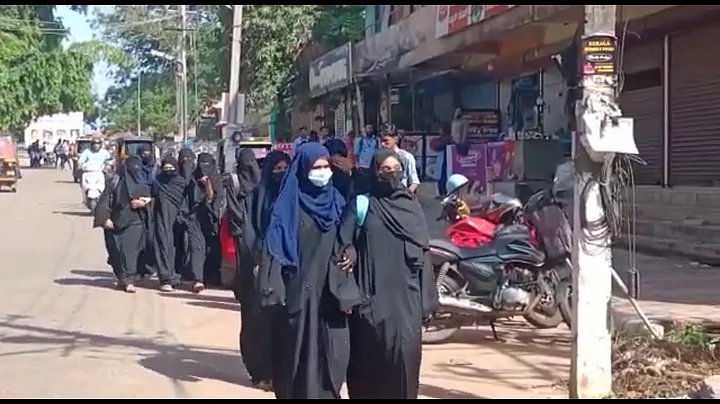In yet another incident of girls wearing hijabs not being allowed to attend classes in Karnataka colleges and universities, 13 students of Mangalore University were denied access to their classes on Monday, 30 May, with authorities citing the order of the Karnataka High Court that had upheld the ban on hijabs.
Students had urged college authorities to permit them to enter the premises wearing a hijab on Saturday as well, but were not allowed to do so.
Three students had then approached the district's deputy commissioner regarding the issue.
The Students' Argument
Arguing to get entry into the college wearing hijabs, the students said that the court's order pertained to pre-university colleges and not degree colleges.
They also alleged that the Akhil Bharatiya Vidyarthi Parishad (ABVP) had turned the entire matter into a controversy to gain publicity.
"We had given a letter to the DC (to review the dress rule) and resolve the matter silently. The issue is going on for one-and-half weeks but it did not attract any publicity because we wanted to resolve the issue legally, but it got publicity because of the ABVP," one of the students said while addressing the press.
They also said that students linked to the ABVP had called on Hindus to come to the college premises wearing saffron shawls on 24 May, as per a Whatsapp chat in a students' group.
District Commissioner Appeals for Peace on Campus
Meanwhile, Deputy Commissioner Rajendra KV said that the authorities had not allowed the students to enter the premises as hijabs or saffron scarves might cause disruptions to the peace on campus.
Authorities had also cited the order by the state's high court, which said that wearing hijabs was not an essential practise in Islam.
"I told them that I cannot challenge the decision of the syndicate members at the district level and they have to abide by the order and rules of the syndicate. They also have to look at the legal aspects as well. I have also appealed to them to ensure peace on the college campus," the deputy commissioner added.
Earlier, the vice chancellor of Mangalore University P Subrahmanya Yadapadithaya had said at a press conference that the university would follow the orders of the high court and the Karnataka government.
"We will abide by the high court and state government's orders. If any student faces any problem in its implementation, we will make a sincere effort to resolve the issue," Yadapadithaya said.
Protest by Hindu Students
Some Hindu students of Mangalore University had staged a protest on 26 May over Muslim students wearing hijabs in classrooms.
Condemning the university authorities for not implementing the hijab ban order by the Karnataka High Court, the students had called for the suspension of the Muslim students.
Speaking to reporters, Vinay, a first-year university student protesting against the wearing of hijabs, said, "It has been months since the court passed the order. But, they continue to wear hijabs. The rule has not been implemented in our college. The authorities called for a parents-teachers meeting and informed them not wear hijab. But, no rule was followed."
The protesting Hindu students alleged that over 40 Muslim students attended classes wearing hijabs. This was done despite authorities asking the students to abide by the court's order during two sets of meetings that were held last month.
Hindu students also boycotted classes and protested in front of the university campus. The students have also said that they will not attend classes until the matter is resolved.
The Karnataka High Court's Order
After months of upheaval, the Karnataka High Court had on 15 March upheld the ban on Muslim girls wearing hijabs with the uniform in schools and colleges.
Dismissing the writ petitions filed by Muslim girl students seeking permission to wear hijab in colleges, the court said that hijab is not part of essential religious practice and that no compelling case was made out for invalidating the government order against it.
"No material is placed before us for evaluation and determination of pleaded conscience of the petitioners. They have not averred anything as to how they associate wearing hijab with their conscience, as an overt act," the court had said while pronouncing its judgement.
It had further added, "There is no evidence that the petitioners chose to wear their headscarf as a means of conveying any thought or belief on their part or as a means of symbolic expression."
